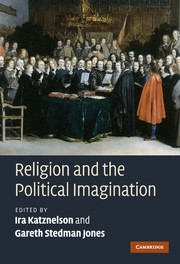Book contents
- Frontmatter
- Contents
- List of contributors
- Acknowledgements
- Introduction: multiple secularities
- 1 Secularisation: religion and the roots of innovation in the political sphere
- 2 Regarding toleration and liberalism: considerations from the Anglo-Jewish experience
- 3 The Enlightenment, the late eighteenth-century revolutions and their aftermath: the ‘secularising’ implications of Protestantism?
- 4 In the lands of the Ottomans: religion and politics
- 5 The Russian Orthodox Church and secularisation
- 6 The American experience of secularisation
- 7 French Catholic political thought from the deconfessionalisation of the state to the recognition of religious freedom
- 8 Religion and the origins of socialism
- 9 From 1848 to Christian Democracy
- 10 The disciplining of the religious conscience in nineteenth-century British politics
- 11 Colonial secularism and Islamism in North India: a relationship of creativity
- 12 The 1960s
- 13 Gendering secularisation: locating women in the transformation of British Christianity in the 1960s
- 14 Does constitutionalisation lead to secularisation?
- 15 Europe's uneasy marriage of secularism and Christianity since 1945 and the challenge of contemporary religious pluralism
- 16 On thick and thin religion: some critical reflections on secularisation theory
- Index
2 - Regarding toleration and liberalism: considerations from the Anglo-Jewish experience
Published online by Cambridge University Press: 05 June 2012
- Frontmatter
- Contents
- List of contributors
- Acknowledgements
- Introduction: multiple secularities
- 1 Secularisation: religion and the roots of innovation in the political sphere
- 2 Regarding toleration and liberalism: considerations from the Anglo-Jewish experience
- 3 The Enlightenment, the late eighteenth-century revolutions and their aftermath: the ‘secularising’ implications of Protestantism?
- 4 In the lands of the Ottomans: religion and politics
- 5 The Russian Orthodox Church and secularisation
- 6 The American experience of secularisation
- 7 French Catholic political thought from the deconfessionalisation of the state to the recognition of religious freedom
- 8 Religion and the origins of socialism
- 9 From 1848 to Christian Democracy
- 10 The disciplining of the religious conscience in nineteenth-century British politics
- 11 Colonial secularism and Islamism in North India: a relationship of creativity
- 12 The 1960s
- 13 Gendering secularisation: locating women in the transformation of British Christianity in the 1960s
- 14 Does constitutionalisation lead to secularisation?
- 15 Europe's uneasy marriage of secularism and Christianity since 1945 and the challenge of contemporary religious pluralism
- 16 On thick and thin religion: some critical reflections on secularisation theory
- Index
Summary
‘Toleration is of course an essential and inseparable part of the great tradition of liberalism.’ With this ringing affirmation, Friedrich Hayek identified with Thomas Babington Macaulay, W. E. H. Lecky, Lord Acton, A. A. Seaton, and other nineteenth- and early twentieth-century predecessors who chronicled the welcome rise of toleration in England as a history of ideas and practices that were constitutively embedded within broader liberal and secular trends. Like these scholars, Hayek surely bore in mind how figures central to the development of liberal ideas and institutions, including John Locke, James Madison, John Stuart Mill and John Rawls, strongly advanced complementary arguments and designs for toleration, and how toleration widened and deepened as liberal political regimes matured.
This chapter guardedly probes the ‘of course’ in Hayek's confident statement. It considers the contingent rather than the ‘essential and inseparable’ status of toleration as a valued feature within the liberal tradition. Did toleration arise in tandem with liberalism? Were its timing, content and scope established by how liberal political ideas and institutions developed? Is toleration indeed part of the core configuration of liberal values and arrangements, a member in full standing among basic commitments geared to protect citizens from predatory regimes, including government by consent, the rule of law, rights for individuals, the free circulation of opinion and political representation? Toleration, I argue, is best understood not as a first-order liberal value but as a constellation of ideas, institutions and practices that came to be linked to a developing set of liberal ideas, institutions and practices by way of a ‘curious patchwork of compromise, illogicality and political good sense’, which is how Trevelyan put things when commenting on the Toleration Act of 1689.
- Type
- Chapter
- Information
- Religion and the Political Imagination , pp. 46 - 69Publisher: Cambridge University PressPrint publication year: 2010
- 2
- Cited by

